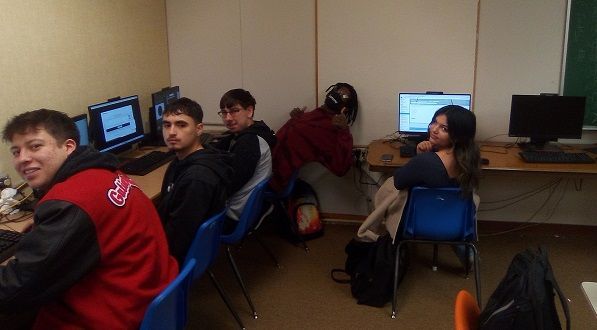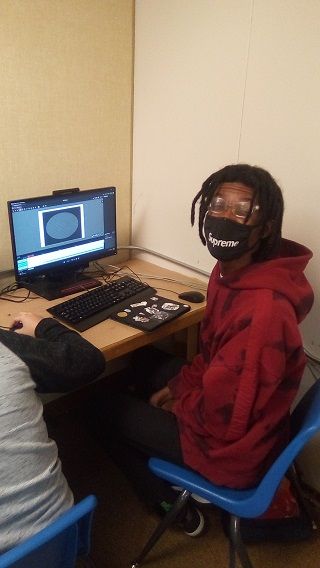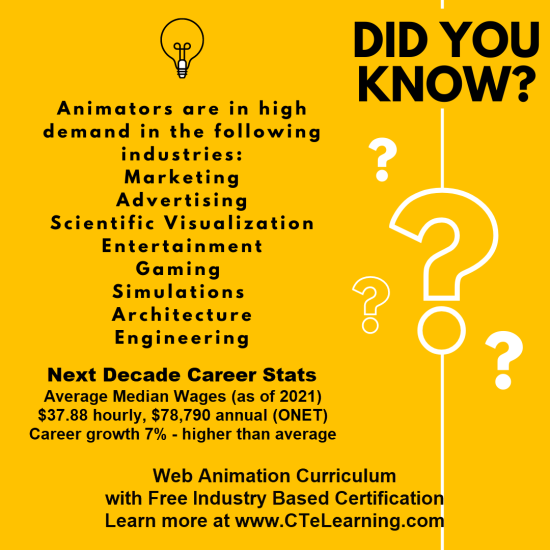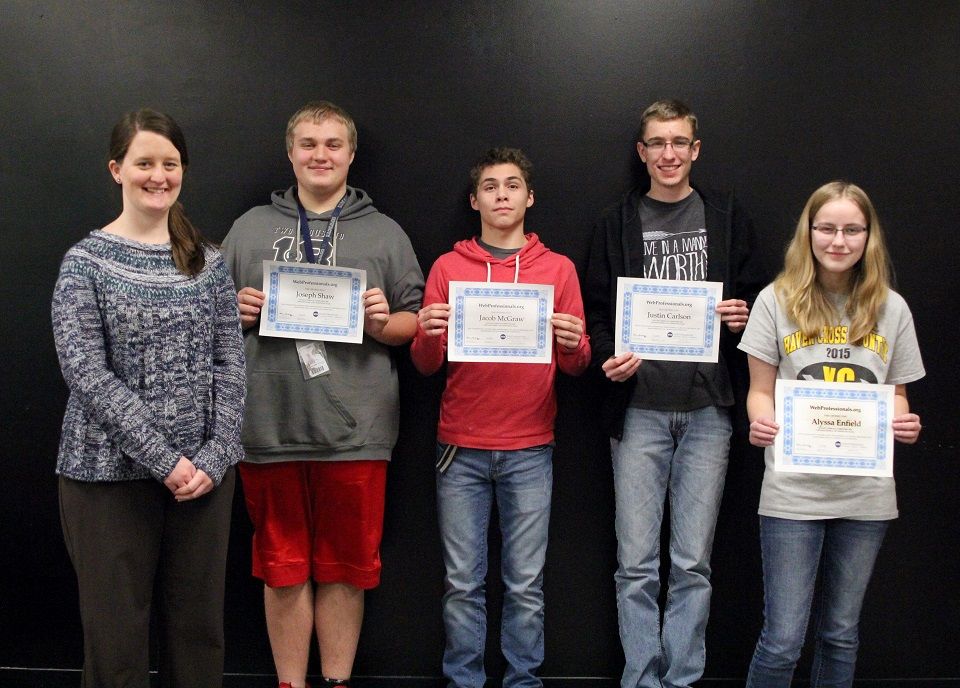Blog
Q&A With Our First Animation Certification Program in Colorado

Teachers love to see students excel. In secondary education, they always are looking for ways to get their students to engage in class. This has become especially true in the post-COVID environment where getting students to re-engage has become more difficult. Oftentimes students feel that there is little relevance for them at school. Through exposure to various career pathways, students learn about new opportunities that they didn’t even know existed.
Today we are highlighting one of our schools in Colorado, Hoehne School District in Trinidad. Jadah Morrison is a K-12 art teacher who is teaching our Web Animation curriculum to her class. In addition to the knowledge and certification through Web Professionals Global the students earn through the course, they end up getting much more.
So often students and their parents will forget what the “A” in STEAM education stands for. As educators, we know it stands for Art. But sometimes the other letters in STEAM get all the attention. It’s often difficult to envision what a career in “A” really means.
However, as an Art teacher, Jadah brings a unique perspective to her classroom. She provides students with context for how the Art aspect can fit into and complement STEAM. Her class, which is classified in the Arts, Audio/Video Technology and Communication career cluster, is also making relevant connections through the interactive projects to Education, Engineering, Health and Marketing career clusters. Students are seeing firsthand how art and technology can come together in the exciting career pathway of animation.

We chatted with Jadah and one of her Animation students, Ken, to hear about their experiences with the Animation curriculum.
Student Perspective
Ken, what are some things that you really like about this animation course?
I had never done an animation class before. I like that I learn all the fundamentals. It has made me think of animation as a possible career in the future.
What were some of your favorite projects so far in the course?
My favorite was the game slab. It is where we help a company launch a new product, and we create the animated commercial for it. In animation, you can make whatever you want.
How did the game slab project help you understand how animation is used in the real world?
I remember Skylander animation commercials from back when I was little. The projects in this course have made me understand more about how animation actually works and what it is like as a job.
Did this project-based curriculum make you feel differently about coming to school and working in school and that kind of stuff?
Yeah, I love coming to this class. Because you know, much of school is like the same old same old school. As a student, I don’t always see how school is going to help my future. Now I get to animate, I am building skills, and I am understanding how the industry works. I have found a passion for animation.
What would you say is more important in life and in career–talent or passion?
I say passion, because you want to keep on doing it. And then you keep on producing and gaining more talent. I could have the talent to play the violin or something. But I’ll never want to do it because it’s not my passion. This animation class will definitely help out my career in the future instead of just going to school and doing the same old same old for things I am not passionate about.
What did you like about hearing from animation professionals?
It gives me a better understanding of animation and a sense that these are the professionals, like a trusted source basically. I could tell they are not just not doing it for money or fame or whatever. They were like me, normal people who have a creative passion. One professional talked about how he still has the passion after doing it for twenty years and wants to keep on doing it for the rest of his life. I feel the same way.
What did your family have to say when you told them you are taking the course?
I told them that I’m taking a class that will help my career in animation and game designing. They said it was great and joked with me to just make sure I don’t mess it up. They can see how much I am interested in this, and I am fortunate how much they support me and my goals. My whole family really wants me to stay on my career pathway and do my own thing.
What would you like to say to the administrators, principal and your teacher who made this class possible for you?
I definitely thank them. My teacher, my principal and everyone really wants me to have this career opportunity. So I don’t, you know, have to struggle on my own. I also have the opportunity to earn my first industry certification. This is how I’m thinking about this: let’s say I want to work for, I’ll say, Blizzard Entertainment. That company would be a good option for me as they create games and need heavy animation. If I have, let’s say, a high school diploma and “A”s in my classes, they will likely say come back to us when you graduate from college. If I earn my industry certification, they still might not hire me quite yet, but Blizzard or any employer will know for sure that I’m not just gonna mess around. I have chosen a career that matches my interests and passion and I have proof.

What would you tell another student who was thinking about taking this class?
I would just tell them to go in there and do it. Because like, there’s no wrong answer. It’s like you’re gonna do it and you’re just gonna learn and the animations you don’t have to be good at it. It’s going to teach you to be good at it. But I would also tell them that next year they are starting the Web and Mobile Game class too, and it has an industry certification too.
Any other overall comments on the class?
You can learn a lot just on your own watching YouTube. And that was ok when I was just starting. But now with Ms. Morrison’s class, I can work on real projects and get to really practice because I am learning all the fundamentals, like the 12 animation principles. Unlike all the YouTube stuff I did at home, here in her class, I can learn it perfectly. It’s explained thoroughly and everything, and Ms. Morrison is great. And in the curriculum I am learning from professionals who actually have years of experience in the industry.
Teacher Perspective
Jadah, what has your experience been like teaching the course?
I really think that being a more hands on art teacher, you know, I’d rather play in clay and ink and paint and get dirty. As far as animation goes, I’m a complete and total newbie. But these kids already know what’s going on. I am loving all the hands-on aspects of the course. I am seeing those creative lights coming on in my students’ eyes. I am loving it.
What do you like about how the Animation curriculum teaches soft skills?
It is great that the curriculum helps me to give the students these technical skills, but my class is also about the soft skills that employers want. The projects and animation professionals help with the soft skills. The modules cover the full range of the career pathway including sound effects, audio engineering, storyboarding, project management, ethics, and critical thinking skills. This gives me confidence knowing my students are becoming whole learners who one day will be whole professionals. Having both technical knowledge as well as real-world soft skills is so important for students to have.
What have you seen the students learn in the course?
As Ken mentioned, all the projects have allowed me to help the students see not only the type of work they could do in the career field but how their work helps others. In this case, they see how their talent and creativity could help a start-up company launch. I know that we all think that entertainment is where animation and art jobs are. But there is so much more opportunity outside of the big studios with art and animation for marketing, training, design, engineering, and much more.
We are excited that due to the success of this course you are expanding your partnership with CTeLearning. Can you tell us more about that?
My principal and I have been so pleased with the success of our animation course that we are adding the Web and Mobile Game Design curriculum next year. This means that next year, Ken will have the chance to earn a second certification, and since these certifications stack, he will have even more upper level credentials to take with him into his next career steps whether that means industry or on to additional education. I am excited about adding the new class and I joke with Ken that it is all his fault. I am already getting students asking about the animation course and the new game course for next year. It is so much fun to see my program grow.
What would you tell other teachers who are considering implementing this course?
I have a couple of students in the class that are about like me, they’re just really not tech savvy. They are learning and being successful at learning just like me. But then you have Ken and other students who’ve already done a lot of this stuff. So I do depend on him to kind of guide his classmates. But the kids coming up, they know how to do this stuff. For us not to offer that to them would be crazy. And if anybody doesn’t try this, they’re nuts.
Any final thoughts?

The Web Animation curriculum has benefited the school in many ways. Hoehne is a small school, so I have all of the grades and no money to buy the things we need. The older kids suffer because we do lots of coloring and paper projects. I don’t have the facilities for screen printing, jewelry, pottery, etc. This animation class has opened the door for all the kids that don’t take art because they want to do more than draw and paint. It is so cost-effective. It also helps because I don’t have to store a bunch of supplies. I am growing my classes, introducing students to real career opportunities in art and helping students to discover their creative talents and passions. Thanks to you and your team for making this possible.
Wrap-Up
When I found out that Jadah was a big fan of the How To Train Your Dragon films, I knew that she would enjoy teaching this curriculum. We even were able to get the Head of Character Animation for the HTTYD series, to send Jadah’s class a personalized message encouraging them in their animation journey. I have found the teachers who still have that playful spark in them just love this course. All of the team here at CTeLearning had so much fun creating this. The chance to work with and learn from so many professionals just made this course development a bit magical at times. Like Ken said, passion is so important. This course really stirred up the passion in all of us here. Thanks to Jadah and Ken for taking the time to give us insights into what they think about our work. Contact us today at 913-764-4272 or hello@ctelearning.com if you are interested in learning how CTeLearning can help you engage your students with exciting career pathways.
Get in touch with us today!
You can book a demo directly using Calendly, call us directly at 913-764-4272 or 877-828-1216, or submit the form below and we will reach out to you.
We look forward to helping you and your students.

Most Recent Posts


About Us
Whether you are a big institution, small school or an individual seeking a new career path, our curriculum is for you.
Request a free demo of our curriculum today to see how you can help fuel our future world.
Get In Touch
PO Box 398 Olathe, KS 66051
hello@CTeLearning.com
Phone: 913-764-4272
Toll Free: 877-828-1216
Fax: 866-307-8112
Email: info@ctelearning.com
Quick Links
All Rights Reserved | Support Learning, Inc.
Web Design by Tekkii


